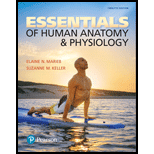
Essentials of Human Anatomy & Physiology (12th Edition)
12th Edition
ISBN: 9780134395326
Author: Elaine N. Marieb, Suzanne M. Keller
Publisher: PEARSON
expand_more
expand_more
format_list_bulleted
Question
Chapter 3, Problem 34SAE
Summary Introduction
To review:
The definition of the biological terminology “atrophy.”
Introduction:
Cells respond to different stimulations like hormones, physical stimulation, and other internal and external factors. Enlargement of a whole organ or specific parts of the body depends on the type of stimulation and its duration.
Expert Solution & Answer
Want to see the full answer?
Check out a sample textbook solution
Students have asked these similar questions
Define atrophy
Cardiac and skeletal muscle are both “striated” types of muscle and yet they have very distinct functional characteristics. a) Skeletal muscle functions as discrete motor units and the cardiac muscle works as a functional syncytium. Define the italicized terms in the previous sentence, explain their importance, and describe the cellular features that underlie these functional differences. b) Cardiac muscle exhibits automaticity, while excitation of skeletal muscle is neurogenic. Define the italicized terms and provide a brief explanation of mechanisms underlying each.
Muscular atrophy occurs when:
Chapter 3 Solutions
Essentials of Human Anatomy & Physiology (12th Edition)
Ch. 3 - 1. Which of the following would you expect to find...Ch. 3 - Adult cell types you might expect to have gap...Ch. 3 - Which of the following are possible functions of...Ch. 3 - 4. A cell with abundant peroxisomes would most...Ch. 3 - A cell stimulated to increase its steroid...Ch. 3 - For diffusion to occur, there must be a. a...Ch. 3 - In which of the following tissue types might you...Ch. 3 - Which epithelium is “built” to withstand friction?...Ch. 3 - 9. What kind of connective tissue acts as a...Ch. 3 - What type of connective tissue prevents muscles...
Ch. 3 - Which of the following terms describe cardiac...Ch. 3 - Cancer is the same as a. all tumors. b. al...Ch. 3 - Prob. 13SAECh. 3 - 14. Although cells have differences that reflect...Ch. 3 - Describe the special function of DNA found in the...Ch. 3 - 16. Describe the four structural components of the...Ch. 3 - Prob. 17SAECh. 3 - 18. What two structural characteristics of cell...Ch. 3 - Explain the effect of the following solutions on...Ch. 3 - Prob. 20SAECh. 3 - Define mitosis. Why is mitosis important?Ch. 3 - Prob. 22SAECh. 3 - Prob. 23SAECh. 3 - 24. Why can an organ be permanently damaged if its...Ch. 3 - Describe the relative roles of DNA and RNA in...Ch. 3 - Define tissue. List the four major types of...Ch. 3 - Describe the general characteristics of epithelial...Ch. 3 - 28. Where is ciliated epithelium found, and what...Ch. 3 - What are the general structural characteristics of...Ch. 3 - Name a connective tissue with (1) a soft fluid...Ch. 3 - Prob. 31SAECh. 3 - 32. Tell where each of the three types of muscle...Ch. 3 - 33. How does tissue healing by fibrosis differ...Ch. 3 - Prob. 34SAECh. 3 - Prob. 35SAECh. 3 - Two examples of chemotherapeutic drugs (used to...Ch. 3 - Hydrocortisone is an anti-inflammatory drug that...Ch. 3 - John has severely injured his knee during football...Ch. 3 - 39. Three patients in an intensive care unit are...Ch. 3 - 40. Michael had a nervous habit of chewing on the...Ch. 3 - 41. Think carefully about the chemistry of the...Ch. 3 - 42. Jeanie was taken to the ER for heat stroke and...
Knowledge Booster
Learn more about
Need a deep-dive on the concept behind this application? Look no further. Learn more about this topic, biology and related others by exploring similar questions and additional content below.Similar questions
- DG2: a. Describe the effect of each of the following on the function of Kinesin, Dynein and Myosin: i) ATP binding ii) ATP hydrolysis b) How might a mutation in the "relay helix" that is found in both Myosin and Kinesin disrupt their respective functions?arrow_forwardWhat complications can occur when your patient is immobile?arrow_forwardDefine activa-tion loop,arrow_forward
- Describe the structure of actin and myosin, including any accessory proteins.arrow_forwardRigor mortis is usually complete within 1 to 2 days after death (depending onenvironmental variables). Why would rigor mortis diminish after several days?arrow_forwardDifferentiate between myopia and hypermetropia on the basis of cause of the defect.arrow_forward
arrow_back_ios
SEE MORE QUESTIONS
arrow_forward_ios
Recommended textbooks for you
 Human Physiology: From Cells to Systems (MindTap ...BiologyISBN:9781285866932Author:Lauralee SherwoodPublisher:Cengage Learning
Human Physiology: From Cells to Systems (MindTap ...BiologyISBN:9781285866932Author:Lauralee SherwoodPublisher:Cengage Learning

Human Physiology: From Cells to Systems (MindTap ...
Biology
ISBN:9781285866932
Author:Lauralee Sherwood
Publisher:Cengage Learning
The Musculoskeletal System | Educational Videos for Kids; Author: Happy Learning English;https://www.youtube.com/watch?v=ynVRDsDC-84;License: Standard youtube license